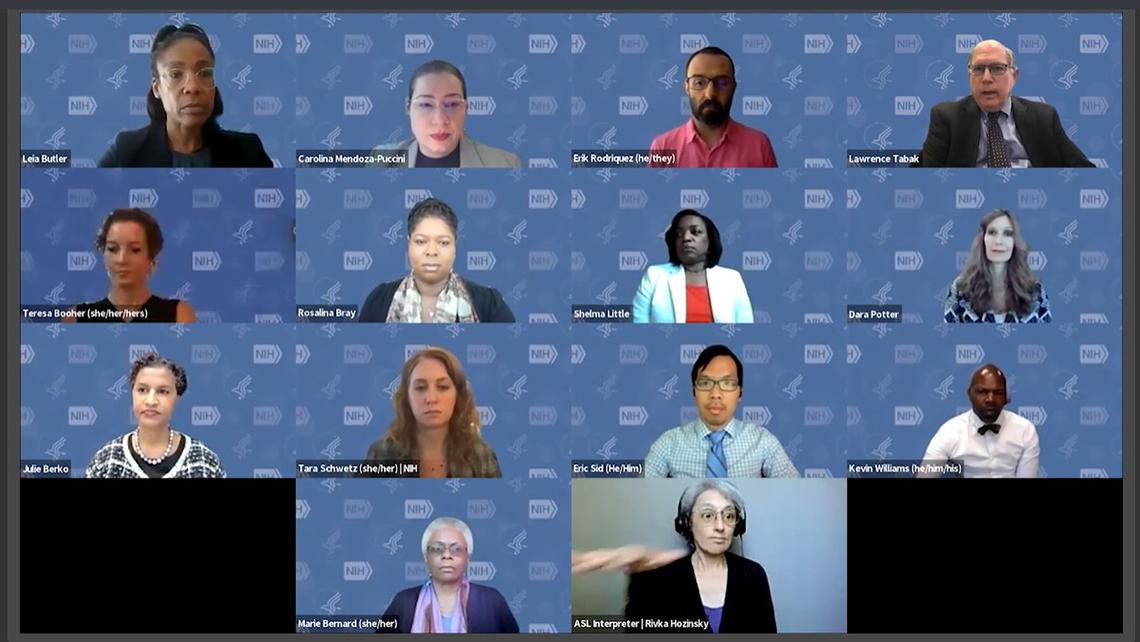‘Diversity Fuels Creativity’
NIH Leaders Talk About DEIA Efforts at Town Hall

NIH is a talented, productive, and resilient agency because of its diversity, said NIH acting director Dr. Lawrence Tabak, during a June 29 virtual Town Hall on Diversity, Equity, Inclusion and Accessibility (DEIA). More than 4,200 NIH’ers tuned in live.
“Diversity fuels our creativity and drives our innovation,” said Tabak. “Ultimately, it enables us to work together to make scientific discoveries that improve human health.”
Last year, Congress directed NIH to develop an agency-wide strategic plan to identify and address racial, ethnic and gender disparities as well as barriers to NIH funding by investigators researching health disparities, said Dr. Shelma Little, advisor to the director of the Office of Equity, Diversity and Inclusion (EDI). Fortunately, NIH had already begun significant efforts in this space and so was well positioned to respond.
The plan was developed and implemented by a working group with representatives from EDI, institute and center directors or their designees, grantees, DEIA experts and community stakeholders, she added. Recently, the working group completed a draft of the plan. It will soon undergo final review and approval.
The plan outlines NIH’s vision for strengthening DEIA, said Julie Berko, chief people officer and director of human resources. It does so by capturing “activities that will apply to the entire NIH workplace,” including the intramural and extramural communities.
“We will embrace, integrate and strengthen DEIA across all activities,” Berko said. “NIH will be a people-centered organization, where all people feel a sense of belonging.”
The plan’s framework has three objectives:
- Grow and sustain DEIA through structural and cultural change
- Implement organizational practices to center and prioritize DEIA in the workforce
- dvance DEIA through research
There are more than 1,700 NIH-wide DEIA activities, said Dr. Marie Bernard, NIH’s chief officer for scientific workforce diversity.
“After the release of the plan, we will build upon these identified activities to develop an implementation plan to propel us forward over the next 5 years,” she said.
One example of a DEIA activity is EDI’s Special Emphasis Portfolio, which focuses on positive, equitable and inclusive employment experiences for federally identified minorities, Bernard noted. A principal strategist leads each portfolio. They organize educational and cultural sensitivity awareness opportunities and recruit and retain a diverse, high-performing workforce.
Another example is the UNITE Initiative, which has worked to create a sense of belonging, promote social accountability and restructure key processes since launching in late 2020. The DEIA performance metric, anti-racism steering committee and racial and ethnic and equity plans developed by ICs all resulted from UNITE’s efforts.
In 2019, staff received the Workplace Climate and Harassment Survey. The results informed new NIH programs such as the anti-harassment committee and approaches to address harassment in the workplace. Bernard said a follow up survey will be administered this fall.
EDI and NIH’s Office of the Chief Information Officer have begun to meet with HHS operating divisions and other federal agencies to learn how they execute their accessibility programs. OCIO hopes to adapt and adopt better accessibility practices.
Next the virtual town hall heard from representatives of special emphasis populations who each discussed challenges they face working at NIH and offered recommendations to advance diversity, equity, inclusion and accessibility.
Special emphasis populations include:
- Asian American, Native Hawaiian, and Pacific Islander
- Black
- Hispanic
- Native American
- People with disabilities
- Sexual and Gender Minorities
- Women
“I ask that we all think about the steps that each of us can take to foster a culture of inclusion, equity, accessibility and respect for all who work at, visit and interact with NIH,” concluded NIH acting principal deputy director Dr. Tara Schwetz. “By working together, I’m confident we can build a workplace and a wider research community in which people from all groups feel as though they’re valued, respected and belong.”
To follow up on the Town Hall, a series of listening sessions will be conducted with NIH leadership. More information will be provided soon for each of these listening sessions.
The event was coordinated by NIH’s Office of Communications and Public Liaison. To watch the full town hall, visit: https://videocast.nih.gov/watch=45624.
